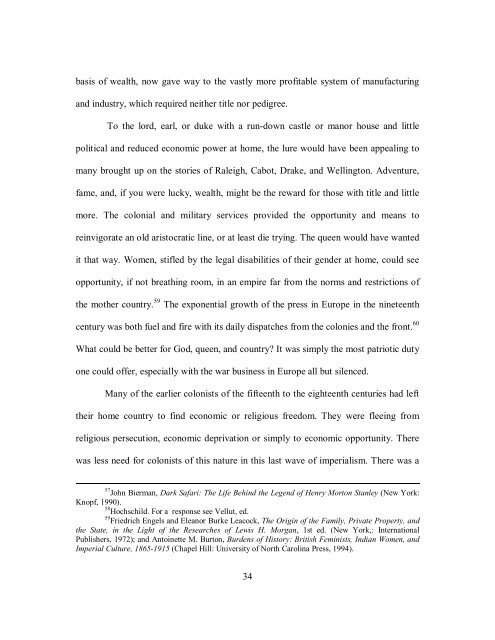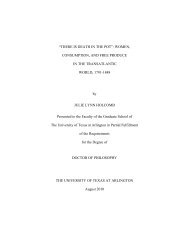EARLY BELGIAN COLONIAL EFFORTS - The University of Texas at ...
EARLY BELGIAN COLONIAL EFFORTS - The University of Texas at ...
EARLY BELGIAN COLONIAL EFFORTS - The University of Texas at ...
You also want an ePaper? Increase the reach of your titles
YUMPU automatically turns print PDFs into web optimized ePapers that Google loves.
asis <strong>of</strong> wealth, now gave way to the vastly more pr<strong>of</strong>itable system <strong>of</strong> manufacturing<br />
and industry, which required neither title nor pedigree.<br />
To the lord, earl, or duke with a run-down castle or manor house and little<br />
political and reduced economic power <strong>at</strong> home, the lure would have been appealing to<br />
many brought up on the stories <strong>of</strong> Raleigh, Cabot, Drake, and Wellington. Adventure,<br />
fame, and, if you were lucky, wealth, might be the reward for those with title and little<br />
more. <strong>The</strong> colonial and military services provided the opportunity and means to<br />
reinvigor<strong>at</strong>e an old aristocr<strong>at</strong>ic line, or <strong>at</strong> least die trying. <strong>The</strong> queen would have wanted<br />
it th<strong>at</strong> way. Women, stifled by the legal disabilities <strong>of</strong> their gender <strong>at</strong> home, could see<br />
opportunity, if not bre<strong>at</strong>hing room, in an empire far from the norms and restrictions <strong>of</strong><br />
the mother country. 59 <strong>The</strong> exponential growth <strong>of</strong> the press in Europe in the nineteenth<br />
century was both fuel and fire with its daily disp<strong>at</strong>ches from the colonies and the front. 60<br />
Wh<strong>at</strong> could be better for God, queen, and country? It was simply the most p<strong>at</strong>riotic duty<br />
one could <strong>of</strong>fer, especially with the war business in Europe all but silenced.<br />
Many <strong>of</strong> the earlier colonists <strong>of</strong> the fifteenth to the eighteenth centuries had left<br />
their home country to find economic or religious freedom. <strong>The</strong>y were fleeing from<br />
religious persecution, economic depriv<strong>at</strong>ion or simply to economic opportunity. <strong>The</strong>re<br />
was less need for colonists <strong>of</strong> this n<strong>at</strong>ure in this last wave <strong>of</strong> imperialism. <strong>The</strong>re was a<br />
57<br />
John Bierman, Dark Safari: <strong>The</strong> Life Behind the Legend <strong>of</strong> Henry Morton Stanley (New York:<br />
Knopf, 1990).<br />
58<br />
Hochschild. For a response see Vellut, ed.<br />
59<br />
Friedrich Engels and Eleanor Burke Leacock, <strong>The</strong> Origin <strong>of</strong> the Family, Priv<strong>at</strong>e Property, and<br />
the St<strong>at</strong>e, in the Light <strong>of</strong> the Researches <strong>of</strong> Lewis H. Morgan, 1st ed. (New York,: Intern<strong>at</strong>ional<br />
Publishers, 1972); and Antoinette M. Burton, Burdens <strong>of</strong> History: British Feminists, Indian Women, and<br />
Imperial Culture, 1865-1915 (Chapel Hill: <strong>University</strong> <strong>of</strong> North Carolina Press, 1994).<br />
34
















